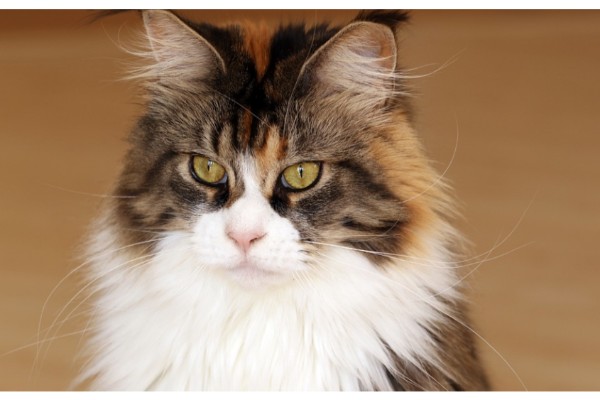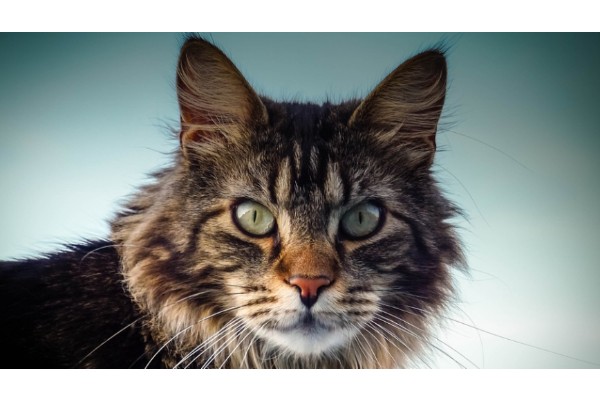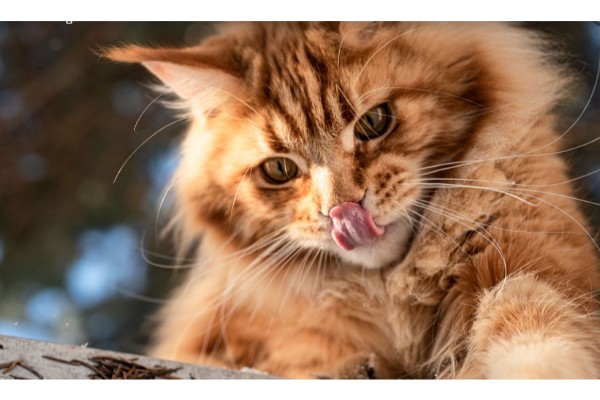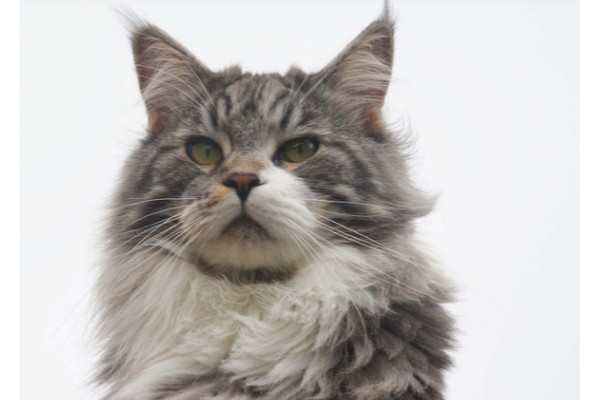The average lifespan of a Maine Coon is 12.5 years. 74% of those Maine Coons lived over 10 years, and 54% of them lived over 12 years. A precise average could not be determined because cats older than 13 were not included in the study. proper care, an active lifestyle, and a balanced diet can significantly influence your Lifespan of Maine Coon.
Table of Contents
What Factors Affect A Maine Coon’s Lifespan?
Your Maine Coon’s longevity depends on numerous factors, such as:
Genetic Predisposition
You might be able to predict any potential health issues your Maine Coon is predisposed to by learning the full history of their bloodline. Knowing how long their ancestors lived can give you a rough idea of how long they might live, but with modern veterinary care and the right care, genetics don’t play a significant role in the longevity of your feline companion.
Diet
Given that they are obligate carnivores, cats need to consume meat in order to be healthy and content. The meat from the human food supply chain is not the same as fresh prey (it gets frozen, defrosted, and comes in contact with various contaminants), so premium cat food is the safest and healthiest option for indoor Maine Coons. A raw diet closely resembles their natural feeding patterns.
The crucial aspects of your cat’s diet are:
- Food quality—Your Maine Coon’s lifespan will be significantly impacted by your choice of products, which should contain the necessary nutrients while avoiding filler ingredients, allergens, and other dangerous substances. Eating poor-quality food can trigger various chronic diseases and shorten your kitty’s life
- Food quantity—Cat owners frequently overfeed Maine Coons because they believe that because of their size, these kitties require more food than they actually do. Eating too much can lead to obesity, diabetes, hyperthyroidism, and digestive disorders

Physical Activity And Mental Stimulation
For healthy growth and maintenance of the body, play is essential. Your cat will have a lot of energy during the kitten stage to play, explore, and exercise.
When a person reaches adulthood and maturity, they frequently adopt a sedentary lifestyle, and during this time, Maine Coons are less easily stimulated and interested in play.
Because a healthy cat is one that is active, giving up is not an option! Grab your feline’s attention by providing:
- New toys—Once a cat’s mind becomes accustomed to a particular toy, they becomes disinterested. Laser lights and catnip toys are always popular among Maine Coons
- A different playground—Moving playtime to another room or installing a climbing wall will present a challenge for your feline
- Post-exercise treats—Instead of giving your Maine Coon random treats, serve them as rewards after playtime or once they learn a new trick
- Suitable exercises—Remember that once your furry friend reaches their senior years, they won’t be able to stay as active as before. The playtime and exercises must be adjusted to their current life stage
Environment
Compared to cats living outdoors, indoor cats typically live longer. The odds of your Maine Coon getting hurt, lost, poisoned, sick, etc. will be lower if you keep them inside, even though they have a strong urge to explore.
Maine Coons are natural hunters, so they’ll probably catch mice, birds, slugs, frogs, and insects if left to roam free. While there is nothing wrong with allowing your gentle giant to give in to its predatory tendencies, it may experience digestive problems after such hunting excursions, such as nausea, vomiting, and constipation. Check on them after they get home to make sure they don’t exhibit any poisoning symptoms.
Allowing your Maine Coone to go outside will make them happier, but it’s best to keep an eye on their outdoor activities.
Healthcare
Maine Coons are susceptible to specific illnesses, despite being generally strong and healthy. For your Maine Coon to live a longer life, regular checkups are crucial. When they get older, going to the vet frequently might be necessary.
Common health conditions you should be on the lookout for are:
- Hip dysplasia—Due to their size, Maine Coons are prone to joint laxity, which often leads to arthritis
- Hypertrophic cardiomyopathy—The cause of HCM is frequently genetic, but it can also be related to lifestyle. The disease can lead to heart failure, so make sure your cat eats healthy and stays active because obesity in cats increases the chances of getting HCM
- Spinal muscular atrophy—The condition is relatively common in Maine Coons and causes the degeneration of muscle-controlling nerves
- Periodontal disease—Gingivitis and, in advanced stages, periodontitis are among the gum conditions that Maine Coons are prone to. Make sure to maintain proper dental hygiene and provide dental cat food to postpone the effects
- Polycystic kidney disease—PKD is a hereditary disease causing ulcers on feline kidneys
While genetic diseases are impossible to completely prevent, you can try to delay them with an active lifestyle and a healthy diet.

The Perfect Diet For Your Maine Coon
The dietary needs of Maine Coons are the same regardless of their stage of life. If they’re old enough to eat solid food—meat is the way to go!
Your cat will live as long and as healthy a life as possible if you give them all the nutrients they need.
Although it is rare for Maine Coons to have food allergies, they can have sensitive stomachs and be picky eaters. Your cat may meow in disapproval if you choose the incorrect kind of cat food. In general, wet food is the best choice; alternatives like dry, raw, semi-moist, or homemade food have some drawbacks.
There is a tried-and-true recipe for success that always works when it comes to the components. The products you offer your Maine Coon must contain the proper ratio of:
Animal Protein
Animal protein is a great primary energy source for cats because of its efficient metabolism. It provides them with essential amino acids, including taurine, that support:
- Muscle tone maintenance
- Skin and coat health
- Proper organ function
Choose foods like chicken, salmon, prawns, mackerel, tuna, etc. that are high in lean meat and fish. The liver is another excellent option, but only in small doses, as excess vitamin, A consumption can be toxic. Ham and pork, which can be wonderful flavor enhancers and treats, are the same.
Vegetable protein is bad for your gentle giant. Your Maine Coon won’t stay healthy and satisfied on a vegan diet. Your cat won’t get the necessary micronutrients from a no-meat diet because it can’t properly digest plant protein. Refrain from consuming anything that contains soy, sweet corn, wheat, peas, carrots, etc.
Animal Fat
Your Maine Coon can successfully obtain energy from fat as a secondary source. It also delivers:
- Healthy fatty acids like omega-3 and omega-6 stop or slow the progression of inflammatory diseases like arthritis, allergies, kidney disease, heart disease, and other conditions.
- An enticing smell and delicious taste make any dish irresistible to your kitty
To prevent weight gain, which could result in obesity and other related problems, make sure to stay within the advised amount (20%).
What Can Untamed Do Lengthen The Life Of Your Maine Coon?
With Untamed as the best of the litter, keeping your Maine Coon healthy and happy has never been simpler!
Our menu’s recipes each offer the ideal ratio of mouthwatering goodness and top-notch nutrients.
Our jelly and gravy products provide:
- Sufficient energy and calories to keep your cat fit and healthy
- Even if they don’t like wet food, your Maine Coon will change their mind after just one bite because of the delicious flavor!)
- A fine source of healthy nutrients, free of any known allergens
Untamed cat food is:
- Vet-formulated—Our recipes are honed by vets, so you can be sure that your Maine Coon’s diet is complete and balanced
- Made with human-grade ingredients—We firmly believe that our cats ought to consume the same high-quality food that we would choose for ourselves. The best ingredients are used in all of our dishes. Each tin has more than 60% of prime meat and fish
- Eco-friendly—All of our products are made ethically. The meat and fish that go into our meals come from sustainable, cruelty-free suppliers, and we use 100% recyclable packaging
Dont’s
- Avoid letting your Maine Coon get fat or lazy. Inflammation, arthritis, and diabetes are just a few of the serious health issues that can develop in cats who are obese. For their well-being, they must maintain a healthy weight.
- Never forego a visit to the veterinarian. In the first six months, a kitten needs to visit the vet frequently for checkups and vaccinations. Along with starting a regular deworming regimen, they ought to get treated for ticks, fleas, and mites that spread disease.
- A healthy adult should visit the vet once a year, and once your cat reaches the age of 10, you should take them every six months to ensure that any potential health issues are caught early.
- Don’t forget to groom yourself. Infections and inflammation can be brought on by matted hair. Hairballs can also be avoided by removing extra hair and dirt.
- Consult your veterinarian for a hairball treatment if you have trouble grooming. In order to keep their claws from growing too long, older cats also require more frequent claw trimming.
- Also, don’t forget to pay attention to your oral, ear, eye, and nail hygiene.
- Make sure your home is cat-proof. Verify that no power cords or hazardous chemicals are lying around.
- Don’t forget about their teeth. Inflammation in the jaw and gums from bad teeth sends bacteria into the bloodstream, causing inflammation throughout the body, heart issues, and possibly even diabetes.
- A change in behavior should not be disregarded. It’s best to visit the vet if your cat is acting a little strangely, becoming more lethargic than usual, or showing a sudden lack of interest in food.
FAQs

How Long Are Maine Coons Inside?
The lifespan of indoor Maine Coon cats should be longer than that of outdoor Maine Coon cats, depending on the cat’s health and genetic makeup. They reduce their risk of an accident, such as being run over by a car or attacked by a dog, by staying inside.
Additionally, they are less exposed to toxins and chemicals. Therefore, a Maine Coon kept indoors should live well past 15 years. But let’s say the indoor cat is obese or suffers from health issues like urinary tract problems. In that case, their lifespan might be considerably reduced.
Is The Lifespan Of Maine Coon Cats Long?
Maine Coons are typically strong, healthy cats, but they don’t always live the longest lives. Nevertheless, they frequently live well into their teen years, with some even making it into their early 20s. Because of this, pet owners should always be ready to care for their animal companion for many years to come.
What Age Is The Oldest Coon Cat From Maine?
Rubble, who was also one of the oldest cats in the world, held the record for the oldest Maine Coon. Rubble passed away in England in May 2019 at the age of 31. Rubble was given to his owner as a gift for her 20th birthday and remained with her until she was 52 years old.
Needs Carbohydrates For Your Maine Coon?
Although carbs are a quick energy boost, cats have little to no use for them.
Cats will receive all the calories, minerals, and vitamins they require if given enough animal protein. Cats lack the liver enzymes necessary to efficiently metabolize large amounts of carbohydrates. Carbohydrates are allowed in your cat’s diet, but not in amounts greater than 3%.
Conclusion
Although the exact median life expectancy of a Maine Coon cat is unknown, healthy cats free of genetic disorders typically live well past 12.5 years.
15 or 16 is a comfortable guess for a healthy Maine Coon, although some people do live into their late teens or early 20s.
You can typically extend the life of your Maine Coon if you pay attention to good breeding, genetics, diet, exercise, and routine care.
